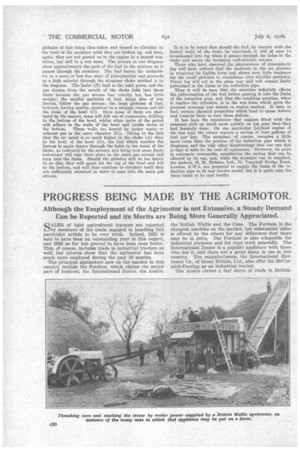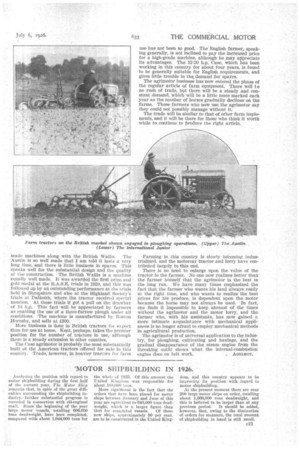PROGRESS BEING MADE BY THE AGRIMOTOR.
Page 10

Page 11

If you've noticed an error in this article please click here to report it so we can fix it.
Although the Employment of the Agrimotor is not Extensive, a Steady Demand Can be Reported and its Merits are Being More Generally Appreciated.
SALES of light agricultural tractors arc reported by members of the trade engaged in handling this particular article to be very brisk. Indeed, 1925 is said to have been an outstanding year in this regard, and 1926 so far has proved to have been even better. This, of course, includes trade in industrial tractors as well, but returns show that the agrimotor has been much more employed during the past 18 months.
The principal agrimotors now on the market in this country include the Fordson, which claims the major part of business, the International Junior, the Austin, the British Wallis and the Case. The Fordson is the cheapest machine on the market, but substantial value is offered by the others for any difference that there may be in price. The Fordson is also adaptable for industrial purposes and for road work generally. The International Junior is a popular appliance with those who use it, and there are a great many in use in this country. The manufacturers, the International Harvester Co., of Great Britain, Ltd., also offer the McCormick-Deering as an industrial tractor.
The Austin claims a fair share of trade in British
made machines along with the British Wallis. The Austin is so well made that I am told it lasts a very long time, and there is little business in spares. This speaks well for the substantial design and the quality of the construction. The British Wallis is a machine equally well made. It was awarded the first prize and gold medal at the R.A.S.E. trials in 1920, and this was followed up by an outstanding performance at the trials held in Shropshire and also at the Highland Society's trials at Dalkeith, where the tractor received special , mention. At these trials it got a pull on the drawbar of 4 h.p. This fact will be appreciated by farmers as enabling the use of a three-furrow plough under alt conditions. The machine is manufactured by Ruston
Hornsby, and sells at 1.300. '• More business is done in British tractors for export than for use at home. Kent, perhaps, takes the premier 'position for the number of tractors in use, although there is a steady extension in other counties.
The Case agrimotor is probably the most substantially built of the American tractors offered for sale in this country. Trade, 'however, in heavier tractors for farm
use has not been so good. The English farmer, speaking generally, is not inclined to pay the increased price for a high-grade machine, although he may appreciate its advantages. The 12-20 h.p. Case, which has been working in this country for about four years, is found to be generally suitable for English requirements, and gives little trouble in thq demand for spares.
The agrimotor business has now entered the phase of the regular article of farm equipment. There will Le no rush of trade, but there will be a steady and constant demand, which will be a little more marked each year as the number of horses gradually declines on the farms. Those farmers who now use the agrimotor say they could not possibly manage without it.
The trade will be similar to that of other farm implements, and it will be there for those who think it worth while to continue to troduce the right article.
Farming in this country is slowly be-coming industrialized, and the motorcar tractor and lorry have contributed largely, to this end.
There is no need to enlarge upon the value of the tractor to the farmer. No one now realizes better than the farmer himself that the agrimotor is the best in the long run. We have many times emphasized the fact that the farmer who wants his land always ready at the right time, and who wants to realize the best prices for his produce, is dependent upon the motor because the horse may not always be used. In fact, one finds it impossible to keep abreast of the times without the agrimotor and the motor lorry, and the farmer who, with his assistants, has now gained a more intimate acquaintance with mechanical appliances is no longer afraid to employ mechanical methods in agricultural production.
The agrimotor is of universal application to the industry, for ploughing, cultivating and haulage, and the gradual disappearance of the steam engine from the threshing outfit shows what the internal-combustion
engine does on belt work. AGRIMOT.
















































